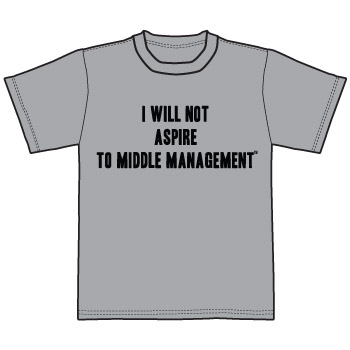You’re not going to understand this unless you read Wednesday’s post.
Rich people know that if you have “something to fall back on”, you’ll fall back.
“Your dream is to perform on Broadway? Good for you. But finish that political science degree, so you’ll have something to fall back on.”
Not to delve into the semantics of this, but think about the expression “fall back”, and its antonym. You’re making allowances for your own eventual failure, or regression, and practically expecting it.
This doesn’t mean that rich people follow their dreams without thinking about worst-case scenarios. It means that rich people don’t even think in terms of “dream achievement” vs. “safe harbor”.
Making subsistence money is not hard to do. (Besides, in the estimation of noted average person Trent Hamm, making more than $25,000 a year barely makes you any happier at all.) But when you do so while in a fallback position, like when you’re using a teaching certificate that you never wanted in the first place, it paradoxically makes it harder to walk away and do something more ambitious. “I put all this time and effort into getting my teaching credential, I might as well use it. Even though I hate everything about the job. Although I suppose I could convince myself that I don’t.”
Finding your passion isn’t just self-help blather. It’s Ricardo’s Law of Comparative Advantage in action. Do what you’re good at, and not just you but the rest of society will benefit. Or just be miserable and do something you hate. What do we care? It’s your life, not ours.
Rich people could absolutely give a damn about being ostentatious. Average people want you to notice and thus validate them.
Jewelry? Seriously, what’s the point?
Rims? You can’t even admire them, because you’re inside the freaking car.
Bottle service? Okay, now you’re just screwing with us. You clearly hate money if you’re paying $300 to have a waitress come to your table and make drinks for you.
What are you talking about? Rich people love to spend money on expensive things. You’re telling me rich people don’t own private jets, etc.? What about Donald Trump?
Slow down, average person.
First of all, Donald Trump isn’t a rich person so much as he is a guy who’s created a character of a rich person that he uses to great effect. The showiness is intrinsic to his celebrity, and frees him from the ignominy of being just another faceless New York real estate tycoon. The outrageous statements, the speculative presidential runs, even the hair: it’s all part of the act.
Take a more ordinary rich person, one of typical rich-person showiness. Warren Buffett doesn’t own a Bombardier Challenger 600 so he can be lavish. (That’s Floyd Mayweather’s thing, and God knows how badly that will end.) Warren Buffett’s time is worth a lot. He isn’t doing anybody any good, himself nor anyone else, by getting to Eppley Airfield 2 hours before a scheduled flight to Denver so he can stand in the TSA line removing his shoes and emptying his pockets while eating a Cinnabon. Better he get where he’s going as fast as possible, move some more assets to higher-valued uses as he does, and get back home. Buffett owning a jet is the equivalent of you owning a car. Or would you prefer taking a bus to work, moving only at the whim of the bus scheduler, and running your errands and going to your kids’ soccer practice without autonomy?
Rich people spend money with the end in mind. They spend for a tangible purpose that more often than not will pay dividends. It’s not “How much will this jet cost me?” It’s “How much will this jet enrich me?” When Warren Buffett and Charlie Munger fly out to Vegas to spend the night dancing and imbibing at Marquee, you can bet they go to the bar and order their own drinks like normal people like rich people.
Rich people see money as a vehicle, not a destination.
The standard axiom is to contrast “journey” with destination, but that doesn’t serve our purposes. Here’s the message of this entire series, reduced to a single example:
Average person:
Can I afford this vacation? I have $x in my savings account.
Rich person:
Can I afford this vacation? My monthly passive cash flow is $x beyond my living and other mandatory expenses.
We used x because the numbers themselves aren’t as important as the observations. In fact, the observations are even more important than whether the person in question can afford the vacation. The responsible average person, who determines that yes, she can, isn’t philosophically different than the irresponsible average person who just whips out her credit card and doesn’t think about how she’ll have to pay the minimum balance for the next 30 years. At best, an average person sees an indulgent expense as something to justify – a tradeoff. Enjoy it now, but it’ll cost you later.
A rich person sees an indulgent expense as something to pay for out of money coming in, rather than out of money sitting stagnant. Obviously, paying for a vacation requires anyone to economize a little. But a rich person thinks about how doing so will reduce his cash flow for a fixed period. An average person thinks about how doing so will reduce his net worth.
Cash flow and net worth. Both are important, but the former is a better indicator of what you can afford in the short term. A rich person wouldn’t take on a frivolous expense that would cut into net worth, or even think in terms of doing so. An average person either doesn’t think about cash flow, or doesn’t have large enough cash flow to warrant said expenses.
Some people read this and grasp it immediately, others don’t. Cash flow is just that, flow. Money coming in. Money goes out too, but the idea is for cash flow to be net positive. The cash flow becomes the more important measurement for determining your ability to buy things, mainly because net positive cash flow, by definition, will always increase your net worth. A rich person knows his net worth is increasing just by looking at his cash flow. He doesn’t even need to look at the net worth.
So a rich person looking to indulge himself doesn’t think about saving and scrimping for the indulgence. He thinks about that money coming out of cash flow instead, which will temporarily lower the flow. He doesn’t think “I’ll have to spend x% of my net worth on this vacation.” He thinks, “I’ll have to spend y days worth of cash flow on this vacation.” When he returns, and no longer has a vacation to pay for, the cash flow picks up where it left off. As if nothing ever happened. Meanwhile, the average person thinks about how to get back to his previous level of wealth.
Rich people aren’t waiting for Daddy to make things all better, average people are.
Finally, and excuse us for quoting ourselves, rich people buy assets and sell liabilities. Average people buy liabilities and sell (or at least, fail to buy) assets. They aren’t blowing hundreds a month on ways to deaden the pain of their unfulfilling lives, get their buzz on, buy Marlboro Lights by the carton because it saves money, I do it because it relaxes me or whatever. Instead, even spending that money on something as mundane as an increased 401(k) contribution will help free you from the miasma of averageness.
That’s the biggest difference between rich and average people, right there. It dwarfs most of the others, which are largely about thought rather than activity. Again, this stuff is unbelievably simple to comprehend, and not all that much harder to act upon. Amazingly, actually making up your mind to embrace it is the hardest part for most people.





